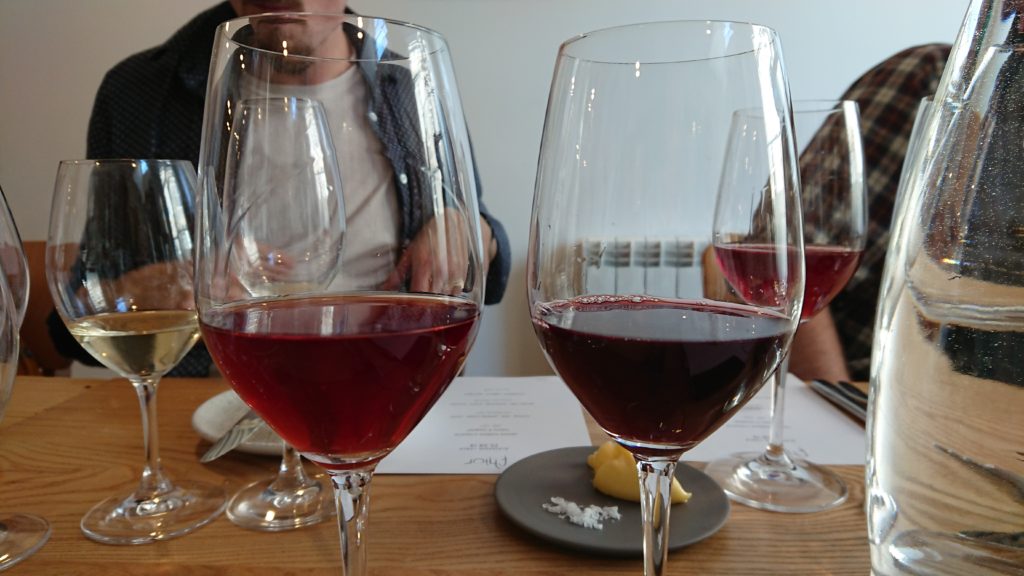
Fhior and Blackbook are a match made in vinous heaven
The food-and-wine matching potential of English bottles was highlighted to Peter Ranscombe over Sunday lunch.
IT’S hard to miss the impact made by Fhior since Scott and Laura Smith opened their restaurant in Edinburgh back in June 2018.
Taking its name from “True” in Gaelic, the eatery lavishes attention on its ingredients – which is why it makes the ideal home for the bottles from Blackbook Winery in Battersea, London.
Winemaker Sergio Verrillo is also an advocate of letting the components be the stars of the show.
In his case, he wants to highlight the quality of grapes from different sites in England.
The combination of Scott’s food and Sergio’s wines made for a rather enjoyable Sunday lunch yesterday – and there wasn’t even a slice of roast beef or a Yorkshire pudding in sight.
Lunch opened with smoked haddock croquettes, Isle of White tomatoes and a seaweed salsa verde, with the acidity from the 2017 Blackbook GMF Yew Tree Vineyard Sparkling Syval Blanc (£23.50, St Andrews Wine Company) cutting through the oily croquette and matching the freshness of the tomato.
I’ve tried these bubbles a couple of times over the past year and the bottle is now really hitting its stride, with peachy notes joining the fresh lemon juice and lemon rind flavours, and the balance between the acidity and the fruity flavours sitting spot on.
While Sergio enjoys experimenting, the core of his range is his chardonnay and his pinot noir, and it’s these Burgundian varieties with which the winemaker shows how his skills are continuing to develop.
Two vintages side by side
It was a treat to try his 2017 Chardonnay (£19.50, Swig) and 2018 Chardonnay (due to be released in October) side by side – especially when paired with Scott’s Orkney scallops accompanied by leeks, smoked cream and caviar.
The 2017 had a warm nose, with wood smoke, lemon rind, red apple and a touch of vanilla, with the lemon rind and vanilla balancing the acidity on the palate.
In contrast, the 2018 was fresher for me, with green apple, lemon and an attractive floral touch on the nose, leading onto really well-integrated acidity and green fruit concentration, focused around red apple, lemon rind and lemon juice.
Both wines were made using grapes from the Clayhill vineyard in Essex, so the differences are partly down to the vintages – a wetter 2017 and a warm 2018 – and Sergio’s use of oak, with a wider range of barrels in 2018 giving him more layers to his flavours.
Plus, the 2018 has only been bottled for a few weeks, so it’ll be interesting to explore this wine again over the autumn as it has time to rest in the bottle and develop further.
Scott’s guinea fowl with mushrooms, pureed potato and broccoli was also accompanied by two vintages; this time, the 2017 Pinot Noir (£19.50, St Andrews Wine Company) and the 2018 Pinot Noir (due for release in October).

Sitting them side by side, the 2017 was much lighter, because Sergio didn’t want to extract too much colour and tannin from the grape skins, whereas he opted for a longer and warmer fermentation for the 2018, leading to its darker shade.
The 2017 still packed a punch despite its light hue – with spun sugar, wood smoke, red cherry and red plum on the nose transferring towards fresher redcurrant, cranberry and ripe raspberry on the palate – while the 2018 was a more serious beast, with darker fruits of the forest aromas and flavours, plus reductive notes straying into blackcurrant.
The god of wine
To finish, a simple arrangement of strawberry, yoghurt and meringue – with Scott explaining that he’d left lemon out of the dish because he felt the 2018 Bacchus (£19.50, St Andrews Wine Company) would supply the citrus freshness, which it did in spades.
It was perhaps the only pairing that didn’t quite hit the spot for me – the bacchus was ripe, and was showing even more balance than when I tried it with Sergio during English Wine Week, but I felt it wasn’t quite rounded enough to serve with the dessert.
Yet that didn’t detract from the quality of the wine – Sergio’s bacchus, a variety named after the Roman god of wine, is still my favourite example of an otherwise very ordinary grape.
TAGS

